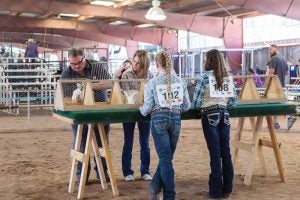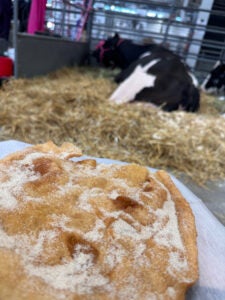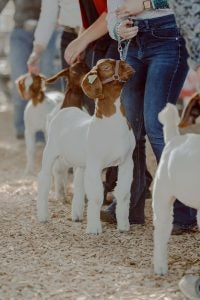Fairs often showcase the best and worst of stress. Those euphoric moments of watching an animal you bred go into the showring, admired by all. Those horrific times when a kid who has worked hard is mistreated by an animal, competitor, or adult. The tranquility of peaceful moments of being the first on the fairgrounds; the exhaustion of being the last on the fairgrounds, with a fair board member making a snide comment.
County and state fairs bring out both our best and our worst. I was a 10 year 4-H member, have been a 4-H leader for 25 years, and proudly wore the 4-H mom title for a decade. I’ve seen the good and bad, the ugly and beauty in people during fair weeks in a few different states. It’s interesting to consider the roles fairs play in our stress as fair season winds down.

Stress reducers
Fair season is all about mindset. These are a few of the outcomes that can serve to reduce stress.
- Family time: You can’t beat summer evenings in the barn/yard working animals, preparing projects, and watching your child learn before your eyes. And sitting in the barn at the fair, united by a common love, sweating, laughing, and crying together? The best.
- Hope: If you’re ever feeling disenchanted about the future of agriculture, talk to a young person showing their animal, why they’re involved, and what they’ve learned. Or watch them find self-pride and the joy of accomplishment in the ring or as they talk with a judge.
- Community: Fair is a place to connect with like-minded people who share your hobbies, passions, goals, etc. You can catch up with friends in the barns and aisles, while visiting about exhibits and helping young people. Some of the best friendships are forged on the fairgrounds.
- Calendar: Putting every single minute of the judging schedule, check-in times, and check-outs on a shared calendar is essential. Getting your kids to help calculate the feed/bedding they need for animals, plan what they need for projects well in advance, and bear the burden of responsibility is essential. Even when they forget to pack their show belt and cry that their pants are going to fall down (true story).
- Real life skills: Need something sewn, repaired, fed, canned, cooked, welded, or decorated? Ask a 4-H or FFA member — they likely picked up the skills competing at the fair.
- Legacy: Breeding and managing dairy cattle as a single mom was tough and expensive — and would have been impossible without the help of friends. But watching my daughter buy her own heifer as a 9-year-old, fall in love with a cow family I’ve had since I was 12, and be so proud to walk into a ring with animals she bred and raised since birth? Priceless and worth every moment of stress.
- Prep: 4-H mom Michelle Eilenstine plans ahead and breaks jobs into small tasks so they’re not daunting. Michigan 4-H dad Rob West said his stress has gone down as his kids got older because they can do more themselves and are better prepared. “Having a camper at fair and preparing ahead of fair helps a lot.”
- Advocacy: “The good stress is the time spent with getting and visiting with volunteers. It is the feeling of a job well done, talking to non ag people, learning from many producers about their farms. It’s worth every stress,” says Utah Farm Bureau volunteer Belva Parr. The same is true when I see 4-H and FFA members proudly share their animals with the visiting public.
- Elephant ears: In full disclosure, my runner daughter means we bring a lot (A LOT) of homemade food because of nutritional needs. But an elephant ear every fair week is tradition — and brings joy to all of us. And you’ll see me with the occasional funnel cake, too. Because food should be about celebration, and there’s a lot to celebrate on a fairgrounds.

Stress multipliers
It seems rhetorical to mention the long days, short nights, weather, and other uncontrollable factors — they’re just part of fair. These are a few of the things that multiply stress at fairs:
- Lack of appreciation: Volunteers don’t expect accolades, but they do need to be thanked. Leaders are often juggling multiple responsibilities, like managing a show while another project area is being checked. Recognizing that volunteers often have conflicting issues and exercising grace goes a long way. It helps to understand that leaders put in hours upon hours behind the scenes — and you are likely only seeing surface level of problem. A heartfelt thank you may be the only bright spot in a tough day of complaints; always take the time to appreciate the village.
- Jealousy: One family who shows on a national level won’t take their cows to the county fair because of how badly they would be treated. Another mom shared that water to her daughter’s pig was turned off the night before the show because of jealousy. Both said their families had positive experiences at the State Fair, in a barn filled with people who understand the hard work and dedication required to compete at a high level.
- Paperwork: This varies by state, but I have seen people turn away from 4-H because of the paperwork. Parents who have been involved in 4-H for a lifetime have difficulty navigating all of the requirements these days and requiring a 9-year-old to complete pages of paperwork for each project adds unnecessary stress to kids and parents. Likewise, an adult questioning the identify of an animal who has been shown multiple years at multiple fairs does little good to anyone involved.
- Disconnect between commercial and show stock: Several producers shared concerns that many fairs have show animals that lack relevancy to commercial operations. One county in Iowa has started a young feeder calf class, where exhibitors are judged on rate of gain, profits, records, and knowledge of their cattle.
- Disrespect: Young people who are uncoachable become difficult employees. Are we going to have in increasingly difficult workforce?
- Ego trips: Fairs should always be about the young people, not the adults in the ring, or the professionals they bring to get a win.
What do you think — are fairs good or bad for mental wellness? That’s an individual choice. For me, they are a whole lot of stress, but the rewards have made fairs be a joyful tradition.

Michele Payn helps the people of agriculture have the tough conversations about managing stress, connecting with consumers, and making sense of science through her speaking and writing. Learn more at causematters.com or follow @mpaynspeaker on social media.



